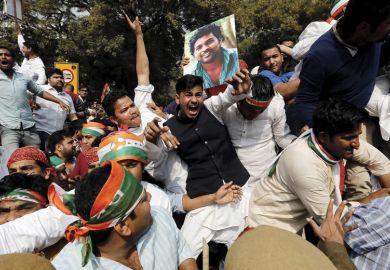Indian academics have criticised a proposal by a parliamentary committee that could see Hindi replace English as the language of instruction on some university courses.
The Official Language Committee, chaired by minister of home affairs Amit Shah, claimed the plan would help the country reduce the dominance of English, which is used in the majority of degree programmes. They argued this would be a step towards undoing colonial-era influence and improving access to education.
While the proposal would need to be approved by India’s parliament to be enforced – something that academics were not convinced will happen – the plan has nonetheless drawn concern from scholars, who noted the move had more political support than similar efforts in the past.
“Because the powerful home minister is apparently involved in these recommendations…everyone expects possible implementation,” said Satyajit Rath, professor emeritus at the Indian Institute of Science Education and Research, Pune.
Professor Rath said that he supported offering education at all levels “in one’s language of choice”, but said that the proposal to move university-level teaching away from English wasn’t workable in practice.
“The major problem in my view is not which language is used for instruction, but whether there are teachers, resources, material and preparation for such instruction to be of reasonable quality,” he said.
“There is not, and there is not likely to be, any reasonable quality of education in non-English medium for many, if not most, subjects.”
Professor Rath predicted that any move to push universities to teach in Hindi would result in “a pretence of education in Hindi, just as there is, for decades, a pretence of official correspondence in Hindi”, referencing the language’s use in government administration.
He worried that India’s private institutions, which have mushroomed in recent years, will offer English-language education to students who can afford it, “creating further schismatic hierarchies”.
Ayesha Kidwai, a professor of linguistics at Jawaharlal Nehru University, also opposed the plan. If implemented, it could violate the law that gives all Indians a right to education despite religion, ethnic or language differences, she said.
Many educated Indians cannot write or read Hindi since they are taught in their regional language, she noted, adding that Hindi is merely one of 22 languages listed in the country’s constitution and 121 languages identified in its 2011 census.
While the recent proposal does support using local official regional languages besides Hindi, such as Tamil and Bangla, academics raised other concerns. They worried that moving the mode of instruction from English could hurt Indian universities’ ability to attract international talent, given its role as the lingua franca of academia.
But Professor Kidwai was most concerned over how such changes could affect students.
“More importantly, Indians will not be able to access education outside India, or enter the local market as job-seekers” if the plan comes into play, she said.
Regional languages “find their way into our classrooms” but it is “very rare” for an Indian language to be the main medium of instruction or language in which a textbook is written, she said.
While she acknowledged that English language education has a colonial origin in India, she was unconvinced this was sufficient reason to stop using it.
“The status of English in independent India and in this globalised world has changed its significance – it is a language of global and wider communication,” she said, adding: “Getting rid of the language English would not be an act of decolonisation but insularity.”
Register to continue
Why register?
- Registration is free and only takes a moment
- Once registered, you can read 3 articles a month
- Sign up for our newsletter
Subscribe
Or subscribe for unlimited access to:
- Unlimited access to news, views, insights & reviews
- Digital editions
- Digital access to THE’s university and college rankings analysis
Already registered or a current subscriber?








